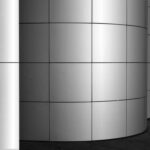There’s an age old debate over which of the major camera manufacturer—in this case, Nikon and Canon—best represents the needs and desires of the individual photographer. It seems as though each of the companies has a strong and dedicated following that’s ready to defend their brand at a moment’s notice. While the real answer to which is best is just as subjective as the art created with the camera, this infographic may help shed some light on the history of Canon’s and Nikon’s growth:
According to the numbers found on the infographic (kindly provided by Digital Picture Zone), Canon has a rather commanding lead as far as sale of digital SLRs are concerned. Canon claims 44.5% of worldwide sales, whereas Nikon commands 29.8% of all worldwide sales.
Canon, who also manufactures binoculars, rangefinders, and an assortment of other products, owns a 19.6 share in global sales when figuring in all Canon products sold—not just their camera sales. The global IDC numbers from 2010 indicate that Nikon’s share in sales of all products sold is 6.7 billion. Among their line of digital cameras, Nikon is well known for manufacturing scanners, microscopes, and spotting scopes.
Like This Article?
Don't Miss The Next One!
Join over 100,000 photographers of all experience levels who receive our free photography tips and articles to stay current:






I am a newcomer here and a light chaser since the early 1950s.
The most useful comment here is from Raj (Apr 26, 2013) that talks about things like image sharpness and color warmth. Having used a Minolta SLR before returning to Canon in making the switch to digital SLR, I appreciate the comments of the Sony users. Sony was very attractive to me since it used the same lens mount and since I have have had a very positive experience with their Cyber-shot hybrid. What pushed me to choose Canon were the shots I had taken with a second-hand Canon F I bought in 1972 and the difference in price between Canon and Nikon.
The other great advice here is DON’T DROP YOUR CAMERA. Particularly in surf.
Looking for (educated) opinions on relative quality including lenses, of Nikon vs. Canon?
Not so much interested in which 1 is cheaper, or sells more, etc.
Doesn’t anyone have opinions about relative quality of Canon vs. Nikon, including lens quality?
In a far-distant past (1960s-70s) I was a reporter, later a bureau chief/regional editor, for United Press International (UPI), which at the time was one of the two biggest news services in the world (AP being the other). At that time Nikons were the only camera people in the news business ever carried, I think mainly because they were incredibly rugged.
I remember once at a national political convention one of our guys dropped one of his Nikons (he carried three) a distance of about 10 feet. We were all sure the camera was toast, but when we took it back to the UPI bureau the only damage was a chipped prism. About five of us took turns throwing the prism against the photo lab wall because we all knew NY HQ would not replace a chipped prism – they’d give our photog a new one only if the prism was completely broken.
So I’ve always been a Nikon guy because of those long-ago experiences. But I think the truth has been expressed above several times: A camera is only a tool; it’s the hand and the eye using it that really matters.
Just don’t drop your cameras!!
We never succeeded, by the way, in breaking that prism, and as far as I know the great UPI photographer Joe Marquette never got a new one from UPI HQ!
I.was considering changing brands when I upgraded equipment recently. I was especially impressed with the Sony system and the Canon 7d. I chose to stay with Pentax & purchase a k-5ii along with some new glass. Personally I liked the k-5ii. It would be less expensive than switching to a new system.
Good points about Pentax…I like the fact that the image stability system resides in the camera, not the lenses.(Theoretically) the lenses should be a little less expensive. Universal backwards compatibility through M42 lenses may be used with a relatively cheap adapter. (limited functionality in some cases). But if on a tight budget, great old used prime lenses are a great way to go. Their da* lenses are, in my opinion, excellent. And I THINK their purchase by Ricoh will be a good thing.
Not so good points…No really pro-level fast lenses…they top out at 300mm f4.0, and the 560mm f5.6, which is more of a wildlife lens. Sigma has a few fast k-mounts. And if you’re waiting for a full-frame Pentax, I just don’t see it. Simply put, I believe most of their new lenses are designed for the APS-C sensor. And I hear that while the focusing system has improved, it’s not on a par with Canon/Nikon. (I’ve had no problems with the k-5ii.)
Sorry for talking your ears off…
This is the last comment on this post. Your question was a stupid question to divide us. All most all who responded are saying “Mine is better than yours”. This sounds more political than anything about photography. Like I said in my first post ” It’s not the camera, it is how you use it “. The last post By Mahesh Rao was right on. matter of fact I won’t stupe so low to comment on another post like this one. I though you guys were about teaching. “Picture Correct ” what does that mean……
These are just stats ! both make exceptional equipment. The camera is a tool, time will be better spent using it and reading on photogrpahy and composition rather than comparing the hardware.
When I bought my first DSLR I went to the store looking at Cannon and Nikon (Sorry to all the Sony and other manufacturer camera users, these were the names I knew in cameras). I held a Cannon camera and I held a Nikon and the Nikon just felt better to me. After I got my camera I bought lenses and other accessories and upgraded the camera from time to time. I never went to Cannon after my first choice because I had already invested in a bunch of Nikon compatible accessories. The investment for changing brand is pretty hefty.
My point here is that this is the advice I usually give to people buying their first camera. Go to the store and ask to see the cameras in your price range. Compare, if possible, the shots and the feel of the camera. Don’t buy because it’s a Nikon or a Cannon buy the one you like.
I like my Nikon, it’s not better or worse than a Cannon, I’m just used to it, and as one person said. “The best camera for the job is the one in your hand”.
“The single most important component of a camera is the twelve inches behind it!”
― Ansel Adams
I’m jealous Mr. Adams. I’m only packing 6 inches behind my camera. Does that make me half the man, or just half the photographer?
I think this is great, and I want to thank the people who are responding. I am learning more from the comments than I did from the article. All I got from the article was that Cannon sells more cameras than Nikon. Thanks to Raj I learned that Cannon does a better job with skin tones and Nikon does a better job with focus. Gene talks about durability and weight. Beverly likes the “feel” of the Cannon. What I was hoping for was a side by side comparison between the two in the same price range. If I may I would like to ask Tiffany M. a question: What brand do you own and why?
Canon most revenue come from scanner and printer. Just compare Raw of 2 camera you will find the difference. Canon also have big investment in Olympus. I found Pentax direct from cam quality is far better then both of these
Both brands have deservedly great reputations. We picked Canon because its version was significantly lighter in weight than the comparable also-fine Nikon, a factor when we take turns hauling the camera gear around on tourist jaunts. However, I think more professionals pick the heavier Nikons for durability (more metal, less plastic). If more pros choose Nikon, that doesn’t make Nikon best overall, but it does suggest that perceived Nikon durability is an over-riding factor for many photography pros. Conversely, plastic may cost less than metal, reflected in some value comparisons and perhaps giving Canon an advantage in features/value per dollar and in the weight contribution to fatigue. It seems a close race, and most buyers are probably happy in choosing either brand.
I have a couple Nikons…a d300 and a Nikon 1 V1 which is totally abused in reviews…but it can do some things that other cameras do not…I use it for street shooting…I also have an Olympus mirror less camera which I am totally happy with and in many ways outperforms my D300..and I am not in a battle with any company . Canon makes great products as does Sony and Panasonic…etc…Choose whatever you like and enjoy it… stop the …my camera is better than your camera…there are people out there shooting amazing stuff on their iphones…Namaste
Nikon 6.7 billion of first quality optics and optical instruments!
Canon 19.6 billion across multiple devices, printers and toys …
I am a Nikon owner, now shootingwith a D800 as my primary camera. I shoot events. My 2nd shooter uses Canon. I have to process both files. He gets a lot of bad shots. That could be because he is not using his camera properly. I also notice, his camera does a great job with skin colors.
I notice that Canon images are slightly warmer in default settings. Nikon seems to focus(pun intended) on sharpness and overall color integrity. Canon seems to focus on saturation and a pleasant warmer image. Out of the camera, Canon seems to produce a more pleasant image for the average user.
I notice that there are more Canon birds/animal shots out there than Nikon of the same. What does this mean? It definitely means that more people own Canon than Nikon…which is why you will see more from Canon.
With my D800 in my hand, I do not envy a Canon owner. However I wish we had more cameras with the availability of fast FPS at each price point. When the 7D came out, I thought of switching brand but bought a D90 instead and have been extremely pleased.
However, we all know that, both brands produce great stuff and if you are not with any, it is you not the camera. I don’t think that either brand gives you an advantage…but then again I have not had to deal with less sharpness and less dynamic range than my D800. BTW, I have always thought that Sony produced the best color integrity….that was about 8 years ago though. Get the camera that feels right in your hand., and also mentally…forget about the small advantages of each brand over each other.
What’s it all about???
Honestly I purchased the Canon because it felt better to me than the Nikon. I have had Nikon film, Minalta film cameras as well as Olympus Digital Cameras, Fuji Digital. They all have something good. My favorite is the Olympus C5050 – it has most of the bells and whistles that the DSLRs have without changing the lens – and the photos are fabulous. Sorry I digress. I agree with the former, that most of the time it is the photographer.
As a very happy Sony owner I have to ask; if Sony leads Nikon in worldwide sales why is it the everyone who writes about photography ignores it and concentrates on Numbers 1 and 3?
Love my Sony also. They are all good cameras, y’all have to know photography, the camera is secondary…..
An important fact has been left out of all those graphics: Ever since Paul Simon took Kodachrome and Nikon to the top (#2 actually) of the pop music charts in 1973, all other things being equal, Nikon appears to me to always be slightly more expensive than Canon. So if I’m shopping on price, and who doesn’t?, keeping in mind that all other things are equal, it’s going to be Canon.
I guess I misunderstood Canon vs Nikon. I thought you were going to compare cameras not who had the most sales. I am sure Ford outsells Porsche does that make Ford a better quality car than Porsche?
Nicely said, damn thats just the truth
Exactly my thoughts…
You can promote Canon or Nikon. I say all high-end cameras are very good. I use a different brand and it does a very good job for me. You are always talking about these two and promote them. But you never say anything about the others cameras out there. Each and every brand has there faults and faults with-in-brand (with different models). It’s not the camera its the user who makes the photo……
Absolutely, All cameras have pros and cons you need to find what works for you and your budget and work at getting the most out of the equipment you have.